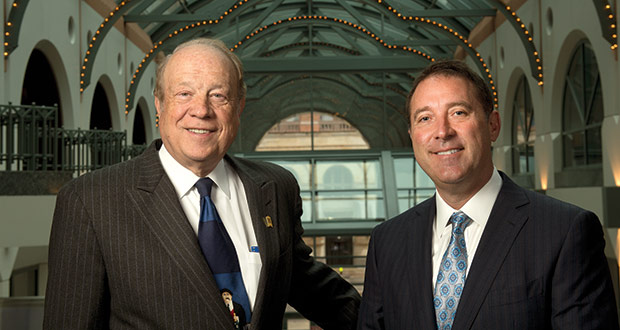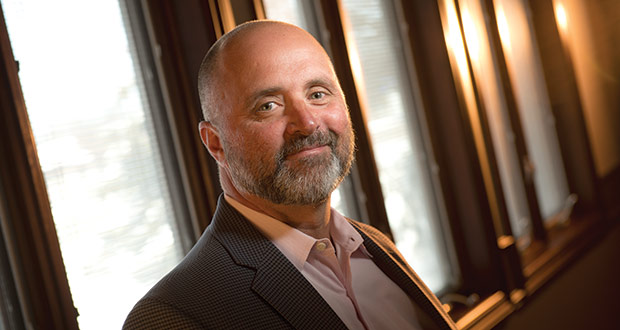How to drum up more business (even if you don’t have a starship captain on your side)
By: JESSICA STEPHEN//April 7, 2016//
How to drum up more business (even if you don’t have a starship captain on your side)
By: JESSICA STEPHEN//April 7, 2016//

Hupy and Abraham found other ways to generate referrals. Below: William Shatner in Hupy and Abraham TV commercial. (Staff Photos by Kevin Harnack)
 William Shatner might do the talking these days in ads for Hupy and Abraham, but that wasn’t always the case.
William Shatner might do the talking these days in ads for Hupy and Abraham, but that wasn’t always the case.
Before Jason Abraham and his partner, Michael Hupy, had the means to hire the actor still most famous for playing Captain Kirk, the firm found other ways to generate referrals.
For years, that meant working with a group of clients often neglected by other lawyers: motorcyclists. Hupy built a name in local personal-injury law by marketing himself to injured bikers.
“It was underrepresented at the time. We’ve now taken that to a whole new level,” said Abraham, a plaintiff’s personal-injury attorney, managing partner and vice president at Hupy and Abraham in Milwaukee.
The niche approach has more than paid off for Hupy and Abraham. And it has become a go-to method for scores of lawyers hoping to distinguish themselves, especially online.
Still, when it comes to finding clients, there’s no guaranteed result for success. From advertising to attorney references and referral fees, even paying for connections through a networking group — lawyers can find an almost overwhelming variety of ways to make a dent in a market already rife with competition.
That’s why, Abraham said, spending money in the hope of finding referrals won’t necessarily make it rain.
John Claypool, a partner at Herrling Clark Law Firm in Appleton, agreed.
“The most effective way (to build referrals) is just to reach out to lawyers,” said Claypool, a personal-injury lawyer and mediator who has been practicing for 30 years. “Be open about being willing to refer cases to them, (ask) if they would refer cases to you and find a firm and lawyer you feel comfortable with. Then do a really good job, because you’ll get more referrals if the client is happy.”
Pay it forward

For Claypool, the best way to find new clients has been to work with lawyers who don’t usually handle personal-injury cases. He usually repays the favor by sending cases that fall outside his practice area to attorneys who have previously given him referrals.
“It’s a good network,” Claypool said.
Claypool said it never hurts to make such arrangements more formal by offering a referral fee to lawyers who are willing to hand off cases. Those fees can go as low as 20 percent, although Claypool said it’s more common to pay a quarter or a third of total attorney’s fees.
“For me it is worth it because, if you really sat down and calculated your hourly rate, even with a referral fee, you’re still making a decent amount of money on a case,” he said. “Not always, but overall it’s worth it because you’re still doing better than the normal hourly rate.”
State ethics rules require attorneys to inform clients of their referral relationships. Claypool said that retainer agreements are usually a good place for such disclosures.
Besides generating income, referral arrangements can help lawyers gain work experience.
Claypool, a former president of the Outagamie County Bar Association, said younger attorneys have hired him to work as co-counsel on cases. Similar to referral agreements, the attorneys share a fee, although co-chair agreements usually mean a 50-50 split.
“They do an equal amount of work, but they have me mentoring them,” Claypool said. “If I was a young lawyer and I didn’t have a firm where I had mentors, I would consider hiring a local lawyer with a good reputation and ask to hire them to co-counsel a case. If you’re a young lawyer putting your shingle out right now, I don’t know how else you’d learn to be a lawyer.”
Shaking hands
For attorneys who have been around longer but are still looking to get a leg up, networking groups offer yet another opportunity.
It’s a method Tim Algiers settled on after years of relying on other marketing strategies.
“I dabbled with local TV commercials. We still do a smattering of newspaper and radio ads. But I would say our best way of keeping business is through word-of-mouth referrals, both from a very huge client base, as well as networking groups with the chambers of commerce,” said Algiers, owner of O’Meara Law Firm, a three-attorney outfit with offices in Hartford and West Bend.
Each month, the West Bend, Hartford and Germantown chambers of commerce hold networking meetings for business owners. Algiers said he sees the gatherings as opportunities to stump for his firm and ask fellow business owners for referrals. What they are not for the most part, he said, is a formal version of his weekly encounters with local business owners through Business Networking International, a members-only organization that invites area professionals to learn about other local business owners and refer clients to them.
There are nearly 20 members in Algiers’ group, and each pays membership fees, which come to $400 or $500 a year or about $650 for a two-year membership. At every meeting, members offer 60-second presentations about their businesses. One person every week also gets an opportunity to expand a little and offer a 10-minute presentation.
These longer speeches often prove a good way of learning what sorts of clients other professionals are looking for and what business might come a lawyer’s way in return.
Although attendance is tracked and members can only miss three weekly meetings every six months, Algiers hasn’t found truancy to be a problem.
“On its face it seems burdensome,” he admitted. “But if you can’t make it you can send subs; if I have court or I’m in trial, I’ve sent my office manager, for instance.”
Algiers also said he doesn’t mind paying membership fees.
“You have some skin in the game,” he said.
Besides, he said, attending the meetings most likely costs less than what he would spend on advertising for similar purposes. So far, he said, his investments have paid off.
“I get a lot of high-dollar referrals. I would say hundreds of thousands of dollars, actually by this time probably over a million dollars in contingencies that I’ve earned from referrals. And that’s just from that group,” said Algiers, a former U.S. Navy attorney who now handles mostly personal-injury plaintiff’s work, along with some civil litigation, criminal defense and traffic prosecutions for the city of Hartford.
Even with the weekly meetings, he hasn’t abandoned other forms of networking and advertising. Algiers still attends Rotary Club meetings, for instance.
“Anytime you have contact with people and they open the door to talk about the business, you do,” Algiers said. “But the lesson that I’ve learned and, in particular being the sole owner of a small business, is you have to spend your advertising dollars wisely. And I have found my best advertisement is myself, exposing myself to as many people as possible.”
It’s a lesson Abraham has embraced, as well.
“You want to dream big, but you also want to dream smart,” he said.
So, new firms shouldn’t necessarily be rushing out to hire Shatner?
“No,” Abraham laughed. “First of all, he’s taken. But, second of all, to mortgage your future is a big mistake. One thing you don’t want to do is really go into hock because you think you’ve got this great idea that’s going to make you all the money in the world.
“Start small,” he added. “Think of ways where you can differentiate yourself from me and the other huge spenders, whether it’s on the Internet or a mailing or going to some sort of meetings or a niche you want to create. It’s a tough market to crack, but there’s always room for someone good and hungry. And there’s always ways to think outside the box for a lot less money.”
Legal News
- Wisconsin joins Feds, dozens of states to hold airlines accountable for bad behavior
- Trump ahead of Biden in new Marquette poll
- Bankruptcy court approves Milwaukee Marriott Downtown ‘business as usual’ motion
- New Crime Gun Intelligence Center to launch in Chicago
- Arrest warrant issued for Minocqua Brewing owner who filed Lawsuit against Town of Minocqua
- Wisconsin Supreme Court justices question how much power Legislature should have
- Milwaukee’s Common Council now has the most African Americans, women and openly LGBTQ members ever
- Office of School Safety Provides Behavioral and Threat Assessment Management Training Ahead of 25th Anniversary of Columbine Shooting
- Wisconsin Supreme Court to hear arguments in Democratic governor’s suit against GOP-led Legislature
- Lawsuit asks Wisconsin Supreme Court to strike down governor’s 400-year veto
- Wisconsin man pleads not guilty to neglect in disappearance of boy
- ACS Selects University of Wisconsin Law School’s Miriam Seifter for 2024 Ruth Bader Ginsburg Scholar Award
WLJ People
- Power 30 Personal Injury Attorneys – Russell Nicolet
- Power 30 Personal Injury Attorneys – Benjamin Nicolet
- Power 30 Personal Injury Attorneys – Dustin T. Woehl
- Power 30 Personal Injury Attorneys – Katherine Metzger
- Power 30 Personal Injury Attorneys – Joseph Ryan
- Power 30 Personal Injury Attorneys – James M. Ryan
- Power 30 Personal Injury Attorneys – Dana Wachs
- Power 30 Personal Injury Attorneys – Mark L. Thomsen
- Power 30 Personal Injury Attorneys – Matthew Lein
- Power 30 Personal Injury Attorneys – Jeffrey A. Pitman
- Power 30 Personal Injury Attorneys – William Pemberton
- Power 30 Personal Injury Attorneys – Howard S. Sicula











